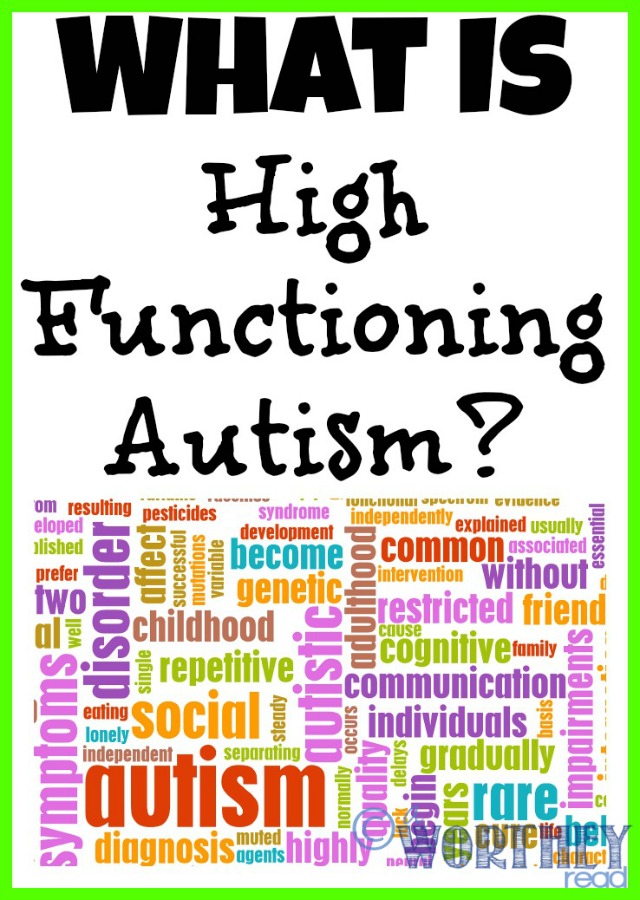But you don’t look like you have Autism. Yes, I hear that all the time. What is High Functioning Autism? Well, let me break it down for ya!
What is High Functioning Autism
“He doesn’t look like anything is wrong”.
This comment I hear all the time when it comes to the twins.
And I’m sure I’m not the only parent.
Having a son or daughter who has autism is one of the most challenging and rewarding things you will ever face, but if that diagnosis is coupled with the term “high functioning” you may find yourself frustrated more often than not.
What Is High-Functioning Autism?
We are often asked this question and would love to address it to help other parents understand more about our children.
Let’s first establish what autism is. Autism is a disorder in developing a person’s social and communication skills.
While that is a basic answer, it gives you an idea of the areas of life that autism will affect.
The range of severity is extensive.
While many autistic children cannot speak for years or even at all, others are considered high functioning and, to the untrained eye, might not be easy to diagnose.
High Functioning Autism doesn’t exhibit itself obviously to outsiders.
The ticks, fears, social, sensory, and mild communication problems are often easy to overlook if a child is high functioning.
Their delay in speech communication may have led them to a small vocabulary until they are close to school age.
Many people only see the current state of a child and have no idea what progress they have made in the past.
Some signs of High Functioning Autism:
- Delayed initial speech but functional communication as the child ages
- Above average intelligence and logic at an early age
- Difficulty in social situations – inability to understand or relate to peer groups
- Lack of social comfort – seeming “mature” for their age and inability to understand jokes, humor, or typical roughhousing among peers.
- Obsessive actions regarding appearance, cleanliness, fears, and social situations
- Sensory or Texture issues. This applies to food, clothing, smells, and anything that may touch their bodies.
- Shortened attention span
- Prone to tantrums or meltdowns when overly tired or overly stimulated
This list is concise compared to the many signs you may see exhibited in your child.
The point of this list is not to give you a comprehensive look but a small understanding of why our children sometimes act the way they do.
For a high-functioning autistic child, day things may look and seem to be the same, but what happens on those rare occasions is what proves their diagnosis.
Next time you see a fidgety child crying for no reason or refusing to eat the food on their plate in a restaurant, think twice before reprimanding the parent.
A high-functioning child with autism may seem perfectly normal on the outside but be caving on the inside.
Their food odor or texture may be too much for them to handle. It could be the end of a hectic and over-stimulating day.
Or it simply could be exhaustion and the inability to focus coming out.
What is high-functioning autism? It’s a diagnosis that explains why some of our children handle social skills and communicate differently than others.
You may also hear, what does a child with high-functioning Autism look like?



Gina says
Oh, thank you, thank you, thank you so much! FINALLY someone that understands my frustration and the tow it takes to have a set of twins with high functioning autism!
My twins are 5 years at this time, they are the most unbelievable thing that has ever happened to me, I have also an 18 year old daughter who has been such big support and a 2 year old that keeps me on my toes, never a dull moment around here.
Thank you for sharing and help others understand our children’s struggle.
Sincerely,
Gina
T Worthey says
Gina- it’s GREAT to meet you! It sounds like we have a lot of similarities! Yes my frustration with this is huge and you will be seeing a lot more posts about it! Thank you for sharing your story!! Yes, sometimes even w/in the Autism Community people don’t get the high functioning aspect. Thank you for stopping by!
Natz says
Hi, I’m reading your messages with huge fear. I’ve been single handed battling with my son for 9 years…. His first 4 years in life were very traumatic and he didn’t speak since then he has issues that are almost military… Where we going…. How long…. How many items are we getting at shopping…. And if it changes…. Meltdown. When he concentrates on the tv…. Or lights or anything that spins…. He pulls very strange faces…. And isn’t aware of it. And obviously he wears clothes…. But jeans or denim he just can’t touch!!!
He has great qualities…. Can swim like a fish and build Lego with his eyes shut. At school he’s doing ok…. Apart from writing and spelling.
Do you think he needs some help??? Am I too late to help??? Where would I even start????
T Worthey says
YES! Natz, it definitely sounds like he has a lot of symptoms that are on the spectrum. I would call his Pediatrician and make an appointment ASAP. I would explain to him everything that is going on. Hopefully, they will give you a referral for testing (Psych testing, etc). If they don’t OR if your insurance doesn’t require you to have a referral, start calling around to see who in your area is good for diagnosing and working with kids on the spectrum. You can also look at the school doing some testing, but like you mentioned– if he is doing okay with school, then they may not see it/do anything about it. But start with his Ped office. Get a referral. and go from there. If you have more questions, you can always email me at awortheymedia (@) gmail (.com)
Lori says
Military spouse here- You don’t have to get a referral necessarily to go to Behavioral Health to get the process started. Just Call BHOP, request an appointment and go from there. You get 8 weeks of appointments free (sessions) and then if they see that testing is needed they will go from there with referrals and what not. Hope this helps! Your PCM might not be so helpful. As you know that already. I know you posted this months ago and I hope you’ve already gotten some help by now but if not please let me know if there is anything else I can do to help or if you’re on your way to getting help! lorikneff @ gmail . com
Jen says
Your boys are ADORABLE. I know several children who are on the spectrum and are high-functioning. They are all unique individuals with their own quirks – just like everyone else! Thank you for this informative article. I’m sharing on Stumble Upon to help spread the word.
WendysHat says
Great post and so true! I could write a book on my experiences over the past 25 years with this. Cute boys! Remember life always finds a way of moving forward whether you are ready for what it brings or not. You’re doing GREAT!
Sadie says
I love your posts like these because it makes people realize that autism can also equal “normal” – from the photos to the activities, everything in your home is amazing. 🙂
Elizabeth says
Just found this – love it! This explains it so well. Thank you!
T Worthey says
thanks Elizabeth for stopping by! Yes this is something we get asked all the time– and it can be so hard to explain it or for people to understand!
Jennie says
When my son was diagnosed it was still called Aspergers at the time. He is 19 now. I think one of the hardest things for him, like you said, was that on the outside he looked like everyone else. But children were quick to pick up on his differences. He was subjected to a lot of bullying throughout 6-9th grade, and suffered through low self-esteem and depression as a result. No matter how much we talked and fought the school system, nothing helped. It was mostly verbal abuse…almost impossible to stomp out. I look back on those years and remember holding my son and promising him if he held on, it would get better. And it did. We were able to get him into a high school for the arts,so that he could concentrate on acting and he was around other people who loved similar things…and everyone there was “celebrated” for the differences. He flourished. He still has struggles,especially now that he has once again shifted into a new environment. But, he has learned coping skills along the way, and has gained a sense of self too. I think each child with autism, no matter where they are on the spectrum, has their own set of struggles and hurdles, but I try to bring awareness to schools especially, that just because a child with autism is “high functioning” does not mean they don’t fight the same internal battles, then have to fight external ones as well. Thank you for writing this article, and helping to spread awareness.
T Worthey says
Thank you Jennie for coming by. I had tears in my eyes reading your response. One, because I get it. Two, because I have that same fear when the twins go to high school about these issues. Right now they are in middle school and it’s been okay. Every day I breathe a sigh of relief when they come home having a good day. I wish people GOT it more. I get soooo tired of trying to fight and explain the reasons WHY my kids need things against responses like, oh well they look normal! How else are they supposed to look?!!!! I would love if you keep coming by and sharing tidbits on what has helped you since your son is older and you’re going where I will be going soon! Thank you!
Jennie says
Absolutely! It has been a struggle at times, but then also moments of sheer joy to see my son, who had so many difficulties trying to find his way, come alive on stage and find a true passion in acting. I love hearing stories of your boys!.im grateful there is more awareness, at least since my son was coming up. But there is still more awareness to put out there, especially for the schools. I think we can help each other through the varying stages
Khadijah says
This completely describes my daughter.
– @kp421
Dawn @ The Momma Knows says
Your final remark is the very first thing that popped into my mind as I read your post. If you know ONE person with Autism, you know one person with Autism. It’s called a spectrum because the range of highs and lows can be so vast, it’s hard to even compare or generalize at all. My 14yo son is also HFA and had some very excellent strengths where I can’t even compare to what this kid just KNOWS about Science, electronics, computers, and anything technical. On the other hand, there is also a delay in communication skills, particularly writing, which really slows him down big time when it comes to school work. He’s very smart but immature for his age. He doesn’t have melt downs, but he does have shut downs, and escapes chaotic situations when needed. He also advocates for himself very well. These kids look perfectly “normal”. It’s getting people to look deeper and engage to understand them that is the hard part, because once someone realizes he’s not neurotypical, many times they don’t try. It is work to be his friend but the people who get there love him so much.
Natz says
Hi, I’m reading your messages with huge fear. I’ve been single handed battling with my son for 9 years…. His first 4 years in life were very traumatic and he didn’t speak since then he has issues that are almost military… Where we going…. How long…. How many items are we getting at shopping…. And if it changes…. Meltdown. When he concentrates on the tv…. Or lights or anything that spins…. He pulls very strange faces…. And isn’t aware of it. And obviously he wears clothes…. But jeans or denim he just can’t touch!!!
He has great qualities…. Can swim like a fish and build Lego with his eyes shut. At school he’s doing ok…. Apart from writing and spelling.
Do you think he needs some help??? Am I too late to help??? Where would I even start????
Steve Lassoff says
Great information! Thank you for sharing. I have shared this on Pinterest.
T Worthey says
Thank you Steve for stopping by and thanks for sharing!
Anddre says
Hi. I’m from Argentina, and the medical system here doesn’t recognize high-functioning autistics as autistic children. Instead, they refuse to diagnose them or even worse, they misdiagnose the kids and send them back to school where they suffer a lot because of their differences, trying to be like the others. I’m fighting the system on my own, looking for different doctors and searching every piece of article about this on internet. Your post gave me hope and I’m extremely thankful for that. I knew it in the bottom of my heart, but nobody would confirm that to me. Now I see a light at the end of the road. Thank you so much.
PS, forgive my English, it’s not my mother language
T Worthey says
You’re welcome Anddree!! I am sooooo sorry to hear of your struggle. It is a fight. A LOT of kids and Parents are where you and I right now. I get so frustrated and cry soo many times about not being able to get people to see what I see and get things done what needs to be done! I wish you all the best, and I’m here if you need to vent!
Melissa says
Above average intelligence only accounts for about 10% of people who fall on the spectrum. It is a strong misconception that high intelligence is so strongly attached to ASD.
High functioning relates to average or above average cognitive ability with the same inhibited social and verbal skills, as well heightened or lowered sensory perception.
I understand what you are trying to communicate here, but to identify high functioning autism solely with high intelligence is incorrect. Too, not all people with high functioning autism prefer adults as social and verbal issues are so broadly ranged.
Autism is often an invisible condition. It’s often the physical stemming or apparent absent or avoidance of physical communicative response to social and environmental surroundings that I believe people are accustomed to noting as “wrong”.
The probable lack of communication among the left and right spheres of the brain, as well as, often higher dependence on their left hemisphere gives to the science, math, and long term memory skills that people often understand as high intelligence.
With a cgild on the spectrum, it has become irritating to hear the constant distinction of functioning levels as it seems almost a a trophy to be high functioning. It’s as though parents or people who don’t fully understand user it as a comfort description. I understand the ease distinctive levels bring when explaining your child to people. However, it also gives way to neglect the real challenges high functionin brings.
What has been most comforting to me is understanding the differences in how a brain with autism works. With regard to my son, knowing how he processes information differently has been the greatest gift to purposely appeal to him in a way that’s comfortable to him and helping him navigate the world through use of his own tools. It is also helpful in defining his specific needs to others.
Place4Papers.com says
Indeed, we should think twice before reprimanding the parents for their kids behaving bad or simply different from the way most other children do. It can be a case of high functioning autism and we have no right to judge.
Mandy says
Thank you for this post. I’m currently going through diagnosis with my child. Every one so far is saying she has the signs but we need to wait for everything to be complete to get a full diagnosis. What I do know is your ‘list’ is my daughter to a t. And I’ve had those conversations with everyone I know. It’s always nice to read blog posts like these and think I’m not going completely mad.
T Worthey says
Good Morning Mandy, thank you for finding me! NO, you are NOT alone and if you have any questions, feel free to leave them here or email me worthey2009 @ gmail . com This journey can definitely be scary, frustrating, hurtful, depressing, exhausting, etc. But knowing that you will get help for your daughter is important. Let me know if I can help in any way!
Scott says
Have you folks seen
Molly says
My daughter Has autism can you had her on here as well it would really help to have people know about it and about how she functions